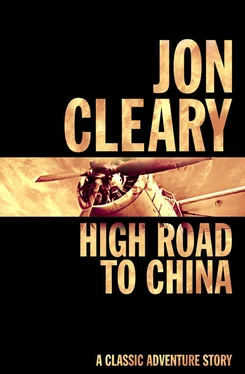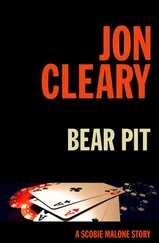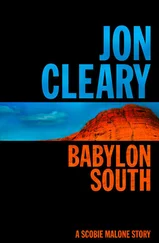1 ...6 7 8 10 11 12 ...19 So far Bradley Tozer had called him nothing but General. ‘You are a respectful man, Mr Tozer.’
‘Not really, General. Just circumspect. I call you other names, but only to myself.’
General Meng nodded, unoffended; if he had to kill this American he would do so for other reasons. He pulled back the sleeve of his voluminous blue silk robe and waved a decorated fan in front of his face. He had come originally from the cooler steppes of Sinkiang and he had never really become accustomed to the more humid heat of Hunan. He was a tall man with a handsome Mongolian face and a head of thick dark hair that was his main vanity. Every morning one of his concubines brushed the black hair for fifteen minutes. It shone like the feathers of a mallard, reflecting any lights that shone on it; the walls of his yamen , his palace, were lined with mirrors to add to the light. Meng could admire himself from any angle at any time of day and his head, the object of his admiration, gleamed like an evil totem to the scores of people who served him in the palace.
He looked at himself in a convenient mirror, then back at the American who could have been his half-brother. ‘I’ll kill you if the statue is not returned in time. I am a man of my word. At least, when it pleases me to be.’
They both spoke in Mandarin, the words a little awkward in their mouths: each in his own way was a foreigner to Peking. Tozer could also speak Cantonese, but Meng had only contempt for the dialect of the shopkeepers from the south. They were not warriors like himself.
‘My daughter will bring the statue. I told you, General – I prize the statue, but not above my own life.’
‘Are you afraid, Mr Tozer?’
‘No,’ said Tozer, hoping he sounded unafraid.
He was taller than Meng, with a hard-boned thrusting face and impatient eyes; he had inherited some of his mother’s features but none of her placidity. Never having known his mother, he had decided to be an American: to have been chosen All-American had brought him a double satisfaction that no one else had known of. He had no time for fools or incompetents, but he was a fair-minded man and he paid better wages than his competitors, and those who survived his stringent standards and demands usually stayed with him for years. He was also a sensible man and he knew there was no sense in applying standards or demands in the present circumstances. Also, he knew enough of Meng’s reputation to believe that the General would be a man of his word. When it pleased him to be.
‘Why is this statue so important to you, General?’
Meng continued to fan himself. He looked at the two bodyguards standing behind him. They were Mongols from the Tsaidam, muscular men in blue coarse wool robes, worn with a sash beneath which the skirt of the robe flared out. Their riding boots had upturned toes and each man had his long pipe stowed in the side of the boot. The robe was worn with one arm free and the shoulder exposed, a décolleté effect that was more threatening than provocative, since the hand of each bare arm always rested on a broadsword hung from a loop in the sash. The martial effect was only spoiled by the flat tweed caps they wore, suggesting a trade union frame of mind that had so far escaped their master. They hated the local Hunanese and were in turn hated, a state of affairs that kept them constantly alert for their own safety and, by projection, that of General Meng.
He waved the fan at them, dismissing them, and they went out of the small room, their heels clumping on the bare wooden floor. Meng waited till the door closed behind them, knowing they would take up their stance outside it, then turned back to Bradley Tozer.
‘Neither of those men speaks Mandarin, but one can’t be too careful. I can’t have them thinking I’m less than perfect.’ He looked at himself again in a mirror, nodded in satisfaction as if the mirror had told him he was as close to perfection as it was possible to be. ‘I am superstitious, Mr Tozer, my only failing. The twin statues of Lao-Tze have brought me good fortune ever since I acquired them some years ago.’
‘How did you acquire them?’
‘I made their owner, a landlord in a neighbouring province, an offer he couldn’t refuse. It’s an old Chinese custom which I believe a certain secret society in Italy has now copied from us.’
‘What was the offer?’
‘His head for the statues. Unfortunately, one of my bodyguards misunderstood an order I gave and the landlord lost his head anyway.’
‘I hope your bodyguards don’t misunderstand any orders you may give about me.’
Meng smiled. ‘I admire you, Mr Tozer. I think you are secretly very afraid, but you won’t lose face , will you? It is so important, face. That is why I want my statue returned.’
Tozer knew not to ask how Meng had lost the statue to Chang Ching-yao in the first place; the matter of face forbade such a question. He waited while Meng fanned himself again, then the General went on:
‘The dog Chang came to see me, under a flag of truce, to suggest an armistice between us. We have been fighting for two years now, as you know. I welcomed him, being a man who prefers peace to war.’ He looked in the mirror again, but the sunlight coming in the window had shifted and the mirror was, by some trick of refraction, momentarily just a pane of light, like a milky-white blind eye. Annoyed, he turned back to Tozer, his voice taking on a ragged edge. ‘While he was here, enjoying my hospitality, he had one of his men steal the statue he eventually sold you. How much did you pay him for it?’
‘Ten thousand American dollars.’
The fan quickened its movement, like a metronome that had been angrily struck. ‘Aah! You know it is worth much more than that, don’t you? Even so, it is enough to buy him two or three aeroplanes. You know that is what he wants, don’t you? He is already recruiting foreign pilots down in Shanghai. I knew it was a dreadful day when he stole that statue. So many things have gone wrong since then. Our harvest has been poor, I’ve had four opium caravans ambushed, yesterday I learned two of my concubines have got syphilis – ’ The fan stopped abruptly, was snapped shut and pointed like a pistol at Tozer. ‘My good fortune will not return until that statue is returned, Mr Tozer. And neither will yours.’
1
The three Bristol Fighters took off on time at noon on Tuesday. O’Malley and Weyman had worked till midnight the previous night, then left the servicing of the planes to the six mechanics Weyman had engaged. Extra tanks were fitted into the rear cockpits of two of the planes and an extra gravity-feeding tank was mounted on the upper wings of the three aircraft. Spare parts were split between O’Malley’s and Weyman’s machines to divide the weight: a spare propeller, six magnetos, vulcanizing kit for repairing burst tyres, an extra-strong lifting jack. When the mechanics fitted the Vickers and Lewis guns they asked questions, but George Weyman told them to mind their own business. Just before take-off he turned up with four boxes of ammunition.
‘All we can afford to carry. We’re right on our weight maximum.’
‘Have you filled the tanks?’ O’Malley asked.
‘Right to the brim. Three and eightpence a gallon – I’m glad our lady friend is paying and not us. It’ll be a pleasure to get away from inflation. How did she handle the machine when you took her up this morning?’
O’Malley had taken Eve Tozer up on a test flight to see how she could handle the Bristol. He had warned her that it had its peculiarities: an inadequate rudder, ailerons that were inclined to be heavy, a tendency for the elevators to be spongy at low speeds; and when he had got into the passenger’s cockpit behind her he had wondered if perhaps they might not get further than Purley, just over the ridge at the end of the aerodrome. He had fitted the Gosport tubes into the earpieces in his flying helmet, picked up the speaking tube and wished Eve good luck, then sat back rigidly in his seat and waited for possible disaster. Like so many pilots he was a bad passenger. However …
Читать дальше












